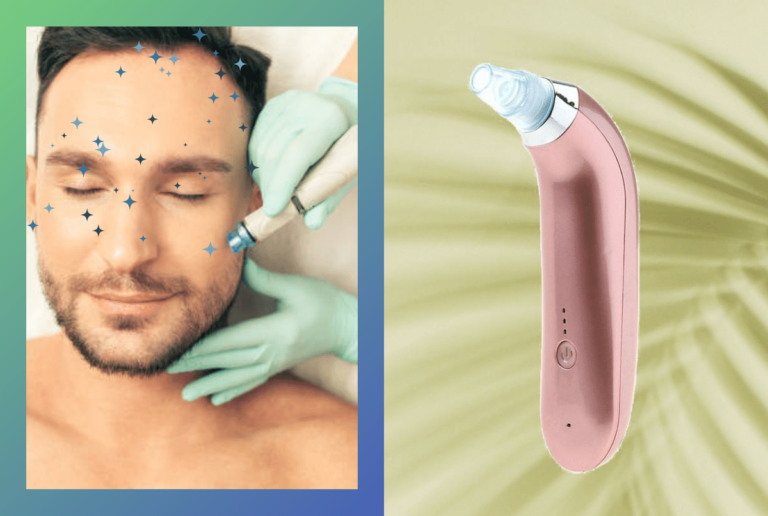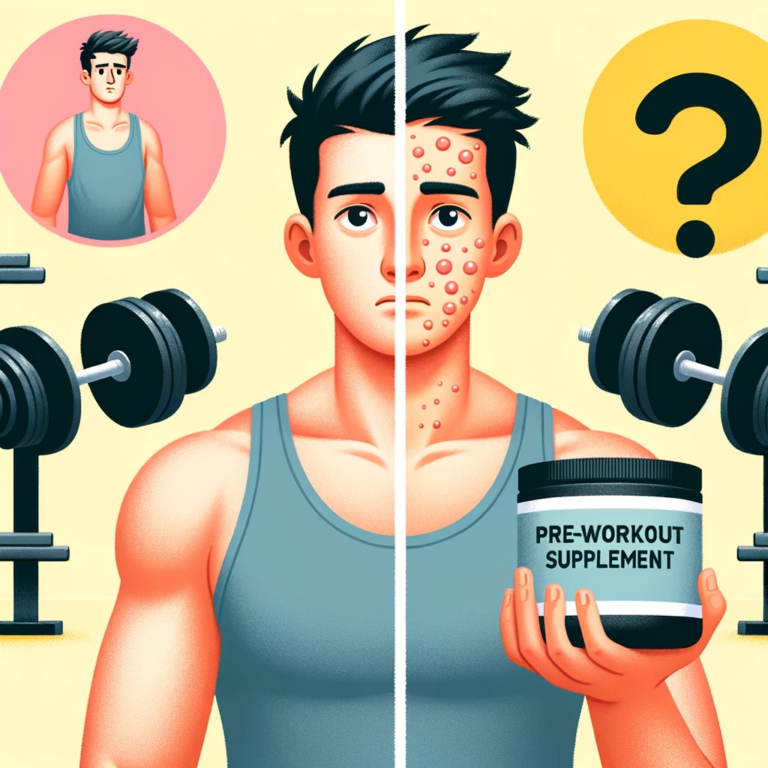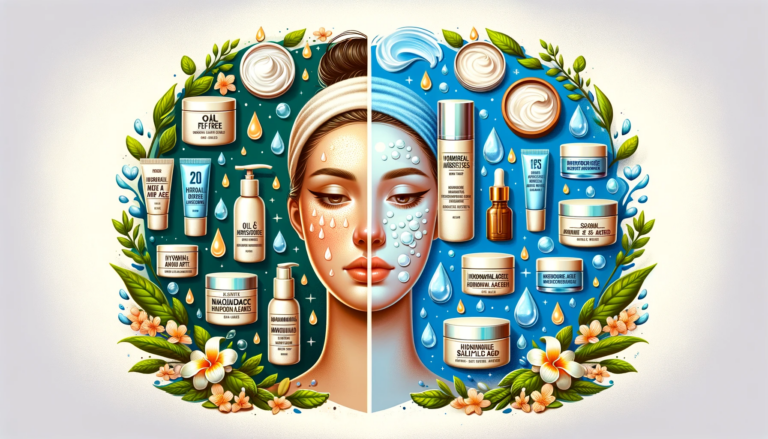Can Probiotics Cause Acne?
Can Probiotics Cause Acne?
This question might seem surprising, especially when probiotics are often celebrated for their health benefits, from boosting digestive health to enhancing immune function.
Yet, the concern about probiotics potentially leading to acne is valid and worth exploring, given the intricate relationship between our gut health and skin condition.
As we delve into the science of probiotics and their effects on our body, it’s essential to understand the nuances of how these beneficial bacteria interact with our skin.
Well, we’ll be going over:
- What is the actual connection between probiotics and skin health?
- Can the introduction of probiotics to your diet or skincare routine inadvertently cause acne flare-ups?
- How can you safely incorporate probiotics into your regimen to harness their benefits without adverse effects on your skin?
Let’s dive in.

What are probiotics?
Probiotics are live bacteria and yeasts that are good for you, especially your digestive system. Often referred to as “good” or “helpful” bacteria, probiotics are found in various foods and supplements, aiming to balance your gut’s microbiome. This balance is crucial not only for digestion but also for your overall health.
You’ll find probiotics in fermented foods like yogurt, sauerkraut, and kombucha, which offer a rich source of these beneficial bacteria. Supplements, on the other hand, provide a concentrated dose intended to ensure an optimal balance of microbes in your gut.
Understanding the impact of probiotics on your health starts with acknowledging their role in promoting a healthy digestive tract. By enhancing the presence of good bacteria, probiotics help in the fight against the harmful bacteria that can lead to various health issues, including possibly influencing skin conditions like acne.
The role of probiotics in gut health
When you dive into the world of probiotics, it’s clear that their primary battlefield and triumph lie within the gut. Probiotics play a pivotal role in maintaining a healthy digestive system by ensuring a balanced microbiome. This balance is not just about digestion; it’s the cornerstone of your overall health.
Probiotics work by enhancing the presence of beneficial bacteria in your gut, which is essential for breaking down food, absorbing nutrients, and warding off harmful pathogens. An imbalance, known as dysbiosis, can lead to numerous health issues, including digestive disorders, obesity, and even mental health problems.
Understanding the complex relationship between gut health and your body means recognizing the power of probiotics. They not only support digestive processes but also have a far-reaching impact on the immune system, proving that what happens in the gut doesn’t stay in the gut.
The gut-skin connection
The link between your gut health and skin condition, often termed the “gut-skin axis,” is gaining traction in scientific circles. This fascinating connection underscores how an imbalance in your gut microbiome can reflect on your skin. Essentially, when your gut flora is out of balance, it can lead to inflammation throughout the body, including your skin, potentially manifesting as acne.
Understanding this connection is crucial if you’re exploring whether probiotics can influence acne. Probiotics aim to restore the balance in the gut’s microbiome, which in theory, should alleviate inflammation, including skin inflammation. However, the response to probiotics varies wildly among individuals due to the unique composition of each person’s microbiome.
It’s also pertinent to note that not all probiotics are the same. Different strains have specific functions and effects on the body. Therefore, identifying the right probiotic strain is key to addressing gut health issues that might be contributing to skin conditions like acne.
Can probiotics cause acne?
You might be hearing a lot about the wonders of probiotics for gut health and are curious if there’s a downside, like the potential for causing acne. While probiotics are praised for balancing the gut microbiome, it’s crucial to understand that everyone’s body reacts differently. In rare instances, introducing new probiotics could lead to changes in the skin, including acne, as your body adjusts to the shift in its microbial environment.
This doesn’t necessarily mean probiotics are harmful or directly cause acne. Instead, this reaction could be part of the detoxification process, where the body is getting rid of toxins and can temporarily manifest as skin issues. Also, considering the vast variety of probiotic strains, finding the one that might trigger an adverse reaction is like looking for a needle in a haystack.
Selecting the right probiotic involves trial and error and understanding your body’s unique needs. It’s paramount to start with lower doses and gradually increase, giving your body time to adjust. Consulting with a healthcare provider to tailor a probiotic regimen that aligns with your health goals can minimize potential side effects, including skin reactions.
Studies on the link between probiotics and acne
Research on the connection between probiotics and acne has yielded mixed results, emphasizing the complexity of the human microbiome and its effects on skin health. A key study published in the Journal of Cutaneous Medicine and Surgery found that probiotics could significantly reduce skin inflammation and, by extension, acne severity. The study involved participants who took a specific probiotic strain for 12 weeks, resulting in noticeable skin improvement.
| Study | Duration | Results |
|---|---|---|
| Journal of Cutaneous Medicine and Surgery | 12 weeks | Significant reduction in skin inflammation and acne |
Another study, this time in the Journal of the American Academy of Dermatology, focused on the gut-skin axis, reinforcing the idea that a healthy gut microbiome can lead to clearer skin. Participants reported not just a decrease in acne but also improvements in overall complexion after incorporating probiotics into their diet.
Yet, it’s crucial to understand that not everyone reacts to probiotics in the same way. Your body’s unique gut flora means that what works for one person might not work for you. This variability underscores the importance of personalized healthcare when considering probiotics for acne treatment.
Factors to consider when using probiotics for acne
Before incorporating probiotics into your skincare regime, there are several factors you need to consider. First, strains matter. Not all probiotics are created equal, and different strains offer different benefits. For acne, strains like Lactobacillus acidophilus and Bifidobacterium bifidum have shown promising results. It’s essential to research and choose a probiotic supplement that contains these or other skin-health-promoting strains.
Second, the delivery method is crucial. Probiotics can be taken orally in pill form, as part of your diet through foods like yogurt and kefir, or applied topically in creams and serums. Each method offers benefits, but if you’re specifically targeting acne, topical probiotics directly address skin bacteria.
Third, individual health plays a significant role in how effective probiotics can be for acne. Factors such as your current gut health, diet, and any underlying health conditions can influence how your body responds to probiotics.
Finally, patience is key. Revamping your skin’s microbiome with probiotics isn’t an overnight fix. It may take several weeks or even months to see noticeable improvements in your acne. Keep this in mind and stick with your regimen for the best results.
Tips for incorporating probiotics into your skincare routine
When exploring the world of probiotics for skin health, it’s essential to consider how you’re introducing them into your routine. Start slow and give your skin time to adjust to new products, especially if you’re incorporating topical probiotics. Patch testing a small area can help you gauge how your skin reacts before fully committing.
Incorporating probiotic-rich foods into your diet is another way to indirectly benefit your skin. Foods like yogurt, kefir, and sauerkraut are packed with beneficial bacteria. Remember, what you put into your body often reflects on the outside.
Opting for probiotic supplements? Ensure you’re choosing high-quality products that specify the strains of bacteria they contain. It’s also wise to look for supplements that have research backing their efficacy for skin health.
Pay attention to how your skin and body respond as you incorporate probiotics into your skincare routine. It’s a process that requires patience and observation. You might not see immediate changes, but over time, the balance in your gut microbiome can lead to visible improvements in your skin’s condition.
Conclusion
Navigating the complex relationship between probiotics and acne requires patience and personalization. While the evidence suggests that probiotics can play a beneficial role in improving gut health and potentially reducing acne, it’s clear that individual responses vary.
It’s about finding the right balance and strain that works for your unique microbiome. Remember, incorporating probiotics into your skincare or diet should be a gradual process. Pay close attention to how your body and skin react and don’t hesitate to consult with a healthcare provider to tailor the approach to your needs.
With the right strategy, probiotics could be a valuable ally in your journey towards clearer, healthier skin.






